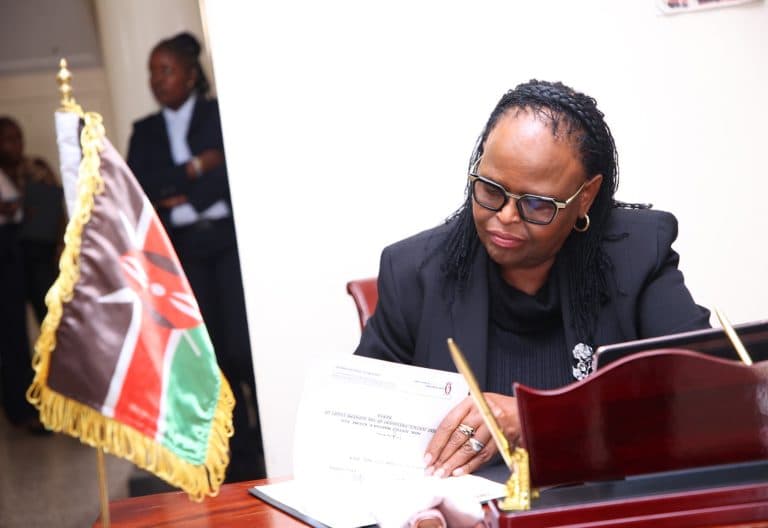We're loading the full news article for you. This includes the article content, images, author information, and related articles.
Nairobi, Kenya – Former Law Society of Kenya (LSK) president Nelson Havi has launched a blistering attack on Chief Justice Martha Koome, accusing her of presiding over the steepest decline in the reputation of Kenya’s Judiciary.

Nairobi, Kenya — September 25, 2025
Former Law Society of Kenya president Nelson Havi has launched a sharp critique against Chief Justice Martha Koome, accusing her of overseeing the steepest drop in the Judiciary’s reputation in Kenya’s history. In a forceful statement shared on his official X account, Havi said that Koome, by her own conduct, has undermined the independence and accountability of the judicial system.
“Never before, in the history of Kenya, has the reputation of the Judiciary plummeted this low,” Havi declared. He continued: “Incompetent CJ Martha Koome has destroyed an accountable but independent legal superstructure created under the Constitution of Kenya as established by her two predecessors.”
Havi’s attack is one of the strongest in recent years against the Judiciary’s leadership, accusing Koome of personal responsibility for institutional erosion.
The Judiciary has already responded to some of his earlier claims: for example, dismissing his allegation that Koome was allocated 32 police officers unfairly.
The row is not new—Havi and other legal personalities have had past disagreements with CJ Koome, including claims of judicial bias, missed court sittings, and interference in matters of public interest.
Havi’s critique builds on longstanding tensions between the Law Society of Kenya, individual lawyers, and the Judiciary. In previous instances, Havi has accused judicial officers of bias or dysfunction, prompting mixed reactions from legal bodies.
In January 2025, a group of lawyers sought the removal of CJ Koome and all Supreme Court justices, citing lack of public confidence in the institution.
The Judiciary itself has defended its integrity, with statements pushing back against what Koome’s office describes as “attacks” that threaten public perception and institutional stability.
The Judiciary’s independence is constitutionally anchored under Article 160 (and related provisions) which safeguard the courts from external interference.
The Judicial Service Commission (JSC) has oversight over discipline, performance, and vetting of judicial officers. It is also meant to defend the Judiciary’s integrity.
If Havi’s claims are to have traction, they would need to be assessed through formal channels: complaints to the JSC, petitions in courts, or oversight by bodies such as the Kenya National Human Rights Commission (KNCHR).
Nelson Havi: Positions himself as championing judicial integrity, framing his critique as a defense of the rule of law.
Judiciary / Chief Justice’s Office: While not yet issuing direct comment on this particular statement, past responses suggest reluctance to engage in ad hominem exchanges.
Legal community / analysts: The debate is likely to polarise opinions—some will view Havi’s statements as necessary pressure, others as dangerously undermining public confidence in courts.
Havi’s prior claims (e.g. about judges missing sittings, or preferential protection to certain judges) have been publicly addressed by the Judiciary or dismissed in public statements.
The Judiciary has faced multiple public confidence challenges, with criticism over delays, case backlogs, executive tensions, and internal disputes.
Risks
Continued escalation of personal attacks may erode trust in both individual judges and the institution as a whole.
The public may become cynical about the Judiciary’s impartiality, reducing willingness to seek legal redress.
The Judiciary could respond defensively with threats of legal reprisal or stronger internal control of public messaging.
Implications
The JSC may be pressured to respond more visibly or proactively to reinforce accountability and public confidence.
Future high-profile judicial decisions may be viewed through the lens of this spat, fueling skepticism or pushback.
The relationship between the legal bar and Judiciary leadership may further fray, complicating cooperation on reform.
Possible Scenarios
Formal inquiry: JSC or an independent panel investigates Havi’s allegations around Koome’s conduct.
Political escalation: The executive or legislature becomes drawn in, either defending or attacking the Judiciary.
Retraction / cooldown: One or both parties deescalate, issuing clarifications or apologies, and returning to institutional engagement.
Whether Havi possesses new evidence or internal documents to support his claims.
Whether CJ Koome will respond publicly or through legal action (defamation, etc.).
How other judges, especially in courts of appeal and high courts, view these exchanges.
How the JSC or court oversight bodies will react—whether passively or with institution-level interventions.
Jan 2025: 13 lawyers file petitions to seek removal of CJ Koome and justices amidst public confidence concerns.
Various occasions (2024–2025): Havi has made earlier criticisms of judicial figures, sometimes prompting calls from the Kenya Magistrates & Judges Association for restraint.
September 25, 2025: Havi issues the latest public attack via X.
Whether CJ Koome or the Judiciary issues a formal rebuttal or engages in counter-critique.
If the JSC opens a complaint or disciplinary process in response.
Reactions from the legal fraternity (LSK, bar associations) and civil society actors on judicial confidence and public trust.
Whether new disclosures emerge (audit reports, internal memos) that support or refute Havi’s claims.
Keep the conversation in one place—threads here stay linked to the story and in the forums.
Sign in to start a discussion
Start a conversation about this story and keep it linked here.
Other hot threads
E-sports and Gaming Community in Kenya
Active 9 months ago
The Role of Technology in Modern Agriculture (AgriTech)
Active 9 months ago
Popular Recreational Activities Across Counties
Active 9 months ago
Investing in Youth Sports Development Programs
Active 9 months ago